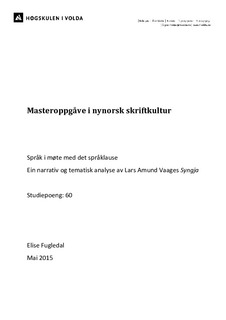| dc.description.abstract | In this master thesis I have analyzed Lars Amund Vaage's novel Syngja. It was published in 2012 and received good reviews. The main character in the novel is the father of an autistic girl called G, and he is also a nation-renowned author. He writes about and to his autistic daughter, who can neither speak nor understand language. Some parts of the story is consistent with Vaage's own life, and the book is thus on the borderline between a novel and an autobiography. In this thesis, Syngja will be read and analyzed as a novel. Any autobiographical fact cannot, in my view, be analyzed in isolation from the literary narrative. In this, I am inspired by Arne Melberg who believes one can see the relationship between fiction and fact, form and content, as a dynamic relationship. My main task has been to take a closer look at how the narrator in Syngja expresses the language issue. On the one hand, there is a communicative language issue: What consequences do the speechless entail for the relationship between the father and the daughter? How is it possible to communicate and understand each other when these elements must be wordless? On the other hand, there is a literary language issue: How should the author-father express the non-language? Is it really possible to communicate something you can neither remember nor fully understand? Perhaps it is what we don’t understand completely which at the same time is the most important to tell about? On this basis, the main issue for my thesis is: What is language in the meeting of non-language? I have chosen to use narrative theory, with Gérard Genette and Petter Aaslestad as my main references. A main point in this theory is that any analysis must take a closer look at how the narrative affects the content and vice versa. I have supplemented this theory with psychoanalytic theory to discuss how the novel expresses the subject's position and existential questions. Here, my main reference is Slavoj Žižek. Žižek's theory about how the subject is divided, and how this fact is fundamental to our existence, has been relevant in connection with the way the narrator in Syngja writes about a subject in an existential crisis. Is it possible that a loss also can be the basis for creating something new and finding a new way forward? The main target in this thesis has been to show that Syngja is not only a novel about a personal life history, but also a text that deals with universal issues. | en |
